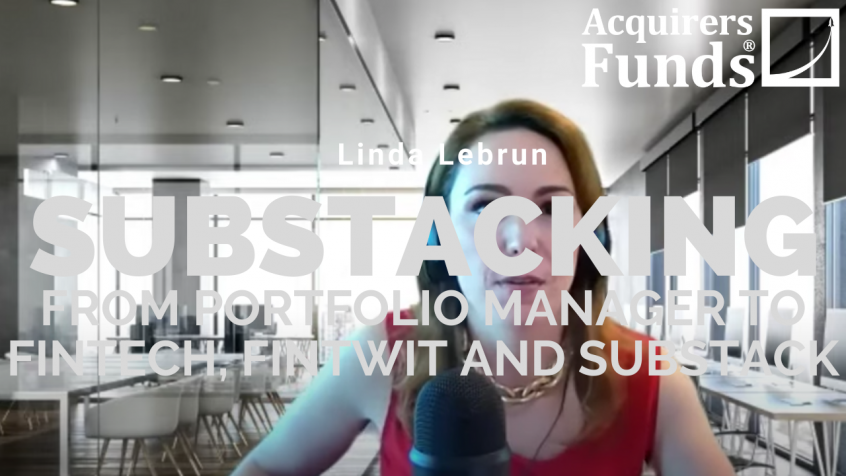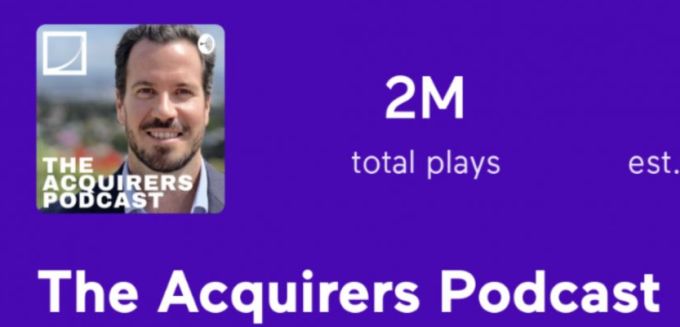In her recent interview on The Acquirers Podcast with Tobias, Linda Lebrun, Director of Finance & Investing Writer Recruitment at Substack, discussed Family Owned European Stocks. Here’s an excerpt from the interview:
Tobias: Yeah, that’s one of my favorite things that I look for, because I always think that he who hops and runs away lives to run away another day. That’s one of the most important things in investing. You also manage global portfolios, what was the universe?
Linda: The universe for that was developed Europe, and then Japan, and I would never claim any knowledge of Japanese stocks. European stocks also, there are a lot where there are– European stocks are famous for having families involved. It was fascinating, because there’s a– I don’t want to make too heavy of a generalization, but often with European firms, there would be more of these types of firms where it would be a holding company with lots of different divisions, lots of different things going on, there have been acquisitions over time and the acquisitions are not flattened into the brand and style of the parent. They are allowed to continue to be headquartered in a small town somewhere and be flourishing and have high margins and generate lots of cash.
Whereas I feel with US small caps, there’s a lot more of an optimization mentality, again, speaking very generally, always think of exceptions. Where in the US, if you are running something that way where you have all these different silos, that each has a lot of ability to behave as they wish and purchase as they wish, you are vulnerable to an activist coming in and saying, “Well, we have 25 MBAs and they are going to optimize the heck out of this thing, and that’s going to evolve you, and you are fired.” There are different ways of coming out how to– it kind of educates you. They’re just different ways of coming out how to build a great business. You can savagely and ruthlessly optimize, and maybe that is why US businesses go all over the world and dominate. But there have also been businesses that remain mid-caps and allow there to be more of a distributed power and less decentralized style, and have done really, really well. Still, once again, you have to look at, how did the business do over an entire cycle, not just the past five years. Then, you have to make thoughtful estimates and forecasts of how the business is going to do over the coming cycle, to make a DCF without making a forecast. I don’t know how you do it.
Tobias: In a European context, is a family owning or controlling the company, is that a positive in your view, or is that a negative?
Linda: I’ll say my own personal bias and this does not reflect on any employers past, present, or future. For me, it is positive just because it is again skin in the game. I’m sure anybody listening can think of a lot of the great European families who run the beverage companies, or food companies, or the ultimate example, the luxury goods companies, and there could now be dozens upon dozens of cousins who have an interest. They probably just all get together once a year. It’s not that they are involved in the business every day, but it gives you a mentality that is of doing something for your grandchildren. I know it sounds like a watch ad in a magazine, but it’s very different. We know that incentives are everything. One of the most important things when you’re looking at any public company we all know is go look at the proxy, see how everybody’s compensated, see what the KPIs are, because that’s what they’re going to do. If you have a management team that is compensated on EBITDA growth, they will grow EBITDA. If you don’t have any kind of return on invested capital metric in the way they’re comped, what do you expect? They will be indifferent to that.
By having these families involved, you could say that there are governance problems and issues too, and it could be insular, but I would say that the benefit of it is simply having that longer-term view. There have been investors who have been very, very successful over the past 15 years, focusing their attentions and their analytical talents on this style of companies.
You can find out more about Tobias’ podcast here – The Acquirers Podcast. You can also listen to the podcast on your favorite podcast platforms here:
For all the latest news and podcasts, join our free newsletter here.
Don’t forget to check out our FREE Large Cap 1000 – Stock Screener, here at The Acquirer’s Multiple:




